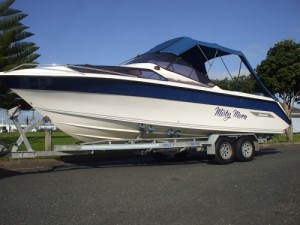 Towing your trailer boat, whether taking it on holiday or going to the local boat ramp, is something all boaties should take seriously. You may think it will never happen to you but seeing a boat going for a sail on it’s own down the road after coming adrift from your tow bar is not a pretty sight! The fact that it may kill or injure someone on it’s adventure should also be enough for you to make safety a priority.
Towing your trailer boat, whether taking it on holiday or going to the local boat ramp, is something all boaties should take seriously. You may think it will never happen to you but seeing a boat going for a sail on it’s own down the road after coming adrift from your tow bar is not a pretty sight! The fact that it may kill or injure someone on it’s adventure should also be enough for you to make safety a priority.
Get the right vehicle to tow your boat
The first thing when towing is to make sure the vehicle you are using is up to the job. Horsepower is essential to cover the weight of whatever you are towing, if it’s not you could ruin the motor and transmission as well as the vehicle’s structure if it can’t handle the weight. Granny’s “shopping trolley” is not designed to tow a large boat. An oil cooling system is also a good idea, put one in if your tow vehicle doesn’t have one. A rear drive or 4WD is a much better option than a front wheel drive for launching and retrieving your boat. If you haven’t considered the Great Wall 4WD’s, check them out. Very good prices on proven technology.
Practice your towing skills
If you haven’t towed anything before then practice in a deserted car park or other open area using plastic milk bottles filled with water as markers. Start manoeuvres with your hand at the bottom of the steering wheel – the trailer will go in the direction you move your hand i.e. move your hand left and the trailer will go left and vice versa. A tow bar should be fitted by a professional as should the electrics, trying to do it yourself is a false economy (unless of course you are a professional in this field yourself).
Make sure it’s safe!
- Check your trailer regularly for wear and tear, cracks in the welds, loose nuts and bolts and such like.
- Please do take the time to make sure the trailer is properly attached to the tow bar – the ball completely engaged and locked on and safety chains bolted.
- Also ensure all the trailer lights and brakes are working. Unplugging the lights before backing into the water can help save your bulbs, just make sure you plug them back in.
- An extra safety chain attached to the bow of your boat from the trailer post gives added safety in the event of a power surge avoiding the boat falling off the end of the trailer, as will a similar attachment from the back of the boat to the trailer in the event of heavy braking prevent the boat ending up in the back of your towing vehicle.
- Check all straps, chains and winch cable regularly for wear and replace if necessary. Cross safety chains underneath the tow bar before attaching and use bolted connections not “S” hooks which can stretch. Don’t have chains dragging on the ground.
- Keep a check on your trailer bearings and grease if necessary. When using “bearing buddies” ensure they are tight on the axle and correctly filled with grease (overfilling can cause the inner seals to blow out of the housing).
- Take a few minutes to do a quick visual check of all safety aspects of your tow vehicle and trailer before leaving.
- Check tyres including the spare to make sure they are properly inflated.
- Also check that there is nothing loose in the boat which may move and cause problems when on the road.
- If you haven’t checked it before make sure the jack you are carrying is adequate and that it will fit under axles and lifting points.
- A fire extinguisher is a part of your safety equipment – make sure you have one either in the towing vehicle or secured to the trailer.
- If your trailer has brakes (usually found on a trailer with a gross weight of 682 kgs and over) make sure they are working. If they are surge brakes check that the brake fluid reservoir is full.
- There is a risk of wheel bearing seizure if the trailer goes into cold water while still hot from the drive so don’t rush launching procedures as this gives them a chance to cool down.
- Make sure you know the rules and regs regarding towing.
- Carry spare bulbs for your lights.
- When launching your boat remember that park and hand brakes only work on the rear wheels whereas the foot brake controls act on all four wheels.
- Ensure that 5% to 7% of the total tow weight is on the tongue of the trailer, handling will be affected otherwise and fishtailing may occur also.
Be safe, be sensible and make sure your vehicle and trailer are up to the job. Happy boating!
